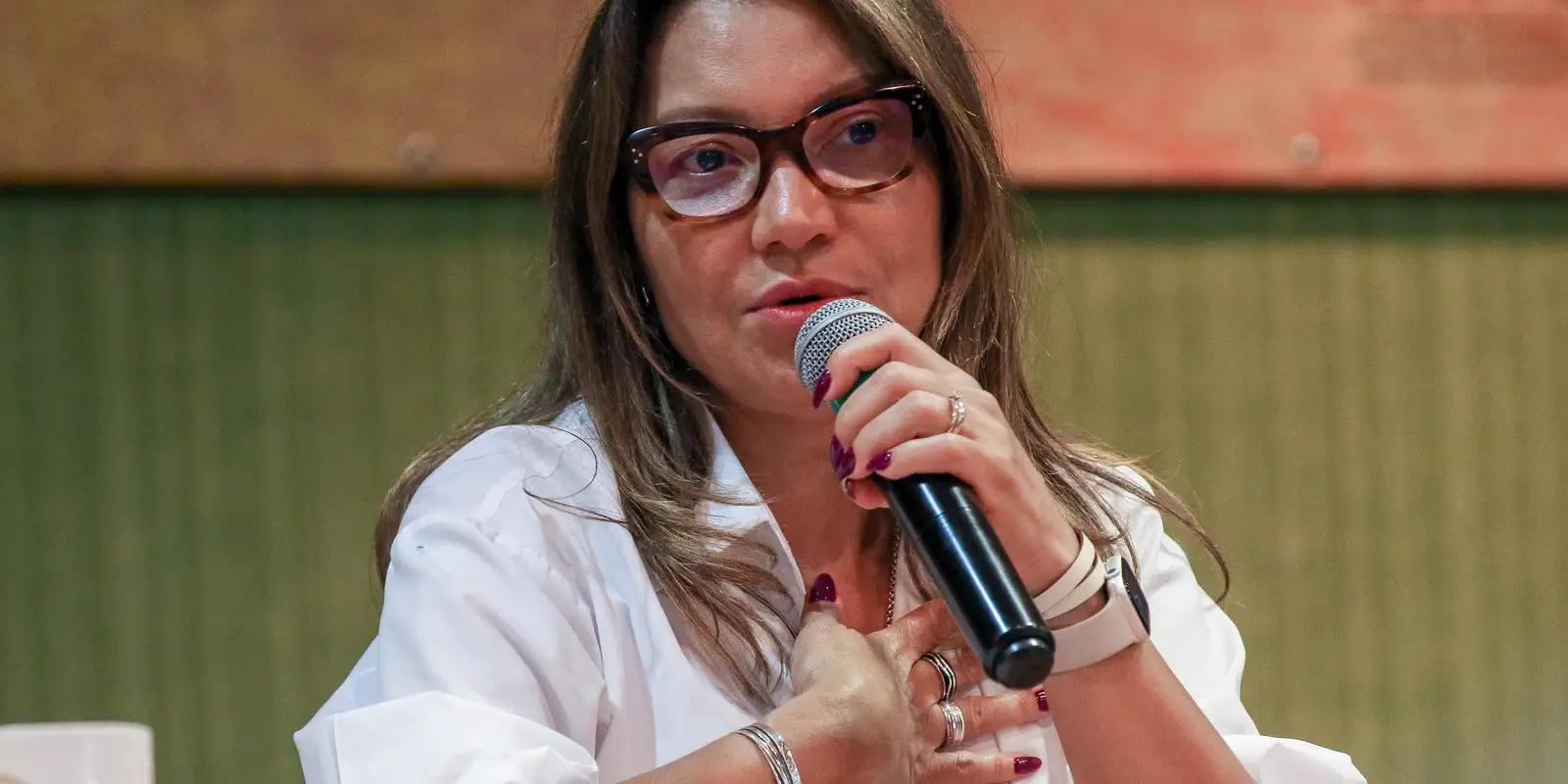
On what is now being called one of the most explosive nights in Brazilian television, First Lady Rosângela Janja Lula da Silva was asked to leave a late-night talk show after a series of shocking and dismissive comments directed at the Brazilian people. The episode aired in the early hours of Tuesday and quickly exploded on social media, triggering a national wave of outrage and debate.
What was meant to be a clarifying interview about the First Lady’s controversial public spending quickly spiraled into a public relations disaster. Janja had been invited onto De Noite, hosted by the ever-bold Danilo Gentile, to address growing concerns about her lavish expenses on international trips and public appearances—despite not holding an official government position.
Gentile began the conversation respectfully, saying, “We’re here to hear your side of the story. Brazilians deserve to understand how this all works, especially since there’s no official budget set aside for the First Lady’s activities.” But Janja’s demeanor turned cold almost immediately. She offered no concrete answers and appeared irritated by even the most basic questions.
When asked about a recent European trip that allegedly cost hundreds of thousands of reais, Janja chuckled condescendingly and replied, “Look, I don’t owe explanations to everyone about where I go or how I get there. There are protocols, diplomatic matters you people don’t understand.”
The audience stirred. But it was only the beginning.
Gentile, maintaining his professional tone, pressed on, reminding her that taxpayer money was being used while the country faced serious issues—overcrowded hospitals, underfunded schools, and rampant poverty. That’s when Janja made the statement that turned the interview from tense to explosive.
“Listen, Danilo, and all of you out there,” she said, gesturing to the audience. “I’m not responsible for Brazil’s problems. If hospitals lack doctors or schools lack infrastructure, that’s not my problem to solve. I have my schedule, my duties, and none of you get to demand answers from me like I’m your mayor or governor.”
The studio went dead silent for a few long seconds, before being overtaken by boos, jeers, and chants of protest. Still, Gentile tried to give her a chance to walk it back.
“Madam First Lady, don’t you think your words were a bit inappropriate? You represent the country alongside the President.”
But Janja doubled down.
“I’m just telling the truth. You want me to lie and pretend I’m some kind of national savior? I’m not playing that populist game. If you’re unhappy, go complain to the people in charge. Don’t come to me.”
More outrage erupted.
As Gentile tried once again to steer the conversation toward transparency—asking why one of her trips cost more than the annual budget of a small city—Janja exploded.
“You really expect me to explain every cent I spend? I don’t owe explanations to you people. You elected my husband, not me. I go where I want, spend what I need, and that’s final.”
The phrase “you people” struck like a slap. It was condescending, divisive, and dismissive of the very citizens who pay the taxes funding her trips. The crowd shouted back, some rising from their seats, demanding she leave the stage. Security had to intervene.

Danilo Gentile, visibly upset but still composed, made a decision rarely seen on live television. He stood up, looked directly at Janja, and said:
“Madam First Lady, I must ask you to leave this program. This show is a space for open and respectful dialogue. You have the right to defend yourself—but not to insult the Brazilian people.”
“Are you kicking me off?” Janja asked, seemingly shocked.
“Yes,” Gentile responded. “This isn’t about politics, gender, or who you’re married to. It’s about basic respect. These people here are hardworking, honest citizens. They deserve better.”
Janja, fuming, grabbed her purse and stormed off, shouting toward the cameras, “You’ll regret this. You have no idea who you’re dealing with.”
But her voice was drowned out by a standing ovation from the audience.
In the moments that followed, Gentile calmed the studio and addressed both the live and home audiences:
“I apologize to all of you for what you just witnessed. This program has always been a place of respect for the Brazilian people. No one—absolutely no one—has the right to treat you with contempt, no matter their position.”
The crowd cheered. Many were visibly emotional. A woman in the front row shouted, “Thank you, Danilo, for standing up for us!”
Callers flooded the show. One nurse from a public hospital said: “We don’t even have enough gauze to treat our patients. And yet we’re being told it’s not her problem. Thank you for not tolerating this.”
A public school teacher added: “We don’t have basic materials for our kids. And someone out there is spending what could fix our entire school—without feeling the need to explain? That’s unacceptable.”
On social media, the reaction was just as intense. Hashtags like #JanjaExpelled, #RespectThePeople, and #DaniloWasRight topped trending topics. One post summed it up: “Finally, someone stood up. No one is above the people.”
Politicians from both sides chimed in—some using the moment to push for more spending transparency, while even government allies admitted Janja’s comments were damaging and indefensible.
Analysts warned the First Lady’s remarks could leave a lasting scar on the government’s image. Her performance was widely seen as arrogant, elitist, and deeply disconnected from everyday Brazilians.
Danilo Gentile, in later interviews, remained firm: “This is not about politics. I would have done the same to anyone—minister, governor, or whoever—who disrespected our people like that. Respect is not a courtesy. It’s a right.”
Calls have since grown for full transparency on all expenses related to the First Lady—complete with itemized reports and justifications.
The episode will likely go down in Brazilian TV history as a powerful example of media holding power to account, and a clear message: in a democracy, no one is above the people.
News
Virgínia Rompe o Silêncio Sobre Leonardo no Hospital e Revela Mágoa Que Ninguém Imaginava
A segunda-feira começou tensa para o mundo sertanejo e para milhões de seguidores atentos a cada movimento da família Costa….
Virgínia rompe o silêncio, se recusa a visitar Leonardo no hospital e expõe ferida que vinha crescendo dentro da família
A madrugada de segunda-feira começou diferente. Ainda antes do sol nascer, portais de Goiás noticiaram que Leonardo havia sido internado…
Sumiço de Neymar em Paris e Story de Biancardi Acendem Alerta: Coincidência ou Recado Silencioso?
O silêncio, às vezes, fala mais alto do que qualquer pronunciamento. E foi exatamente esse silêncio que transformou a ausência…
O silêncio de Neymar, o sumiço repentino e a indireta de Biancardi que deixou tudo ainda mais tenso
Tudo aconteceu de forma silenciosa demais para ser normal. Sem anúncio oficial, sem justificativa clara e sem aquela movimentação típica…
O pedido inesperado das Marias para o Natal deixa Virgínia sem reação e derrete a internet
O clima já era de festa, casa cheia, risadas espalhadas pelos cômodos e aquele barulho gostoso de família reunida quando…
O Pedido de Natal das Marias que Deixou Virgínia em Choque e Derreteu a Internet
O Natal ainda nem chegou, mas um momento simples dentro de casa foi suficiente para emocionar, arrancar risadas e surpreender…
End of content
No more pages to load









